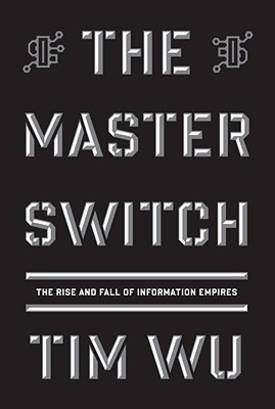The most incredible anecdote in Tim Wu's "Master Switch" is about how a Bell Labs researcher discovered tape storage (and answering machines) in the 1930s. The telephone company buried the invention because it feared that people would use telephones less.
The anecdote comes as Tim Wu describes "The Cycle", how information industries go through a cycle of consolidation and decentralization. Decentralized information industries (telegraph, telephone, movies, radio, television) are eventually brought into a low-innovation state by monopolizers. The monopolist quashes all potential threats (internal and external) until some upstart outsider-innovator manages to sneak past, usually with the aid of government regulation that reestablishes a competitive market place.
In the final part of the book, he fingers Apple and AT&T as the would-be monopolists, pointing out that the success of the iPod, for example, owed more to deal-making than to technical sophistication. He fears for the future of the internet if power gets centralized again in the hands of a cartel such as Apple + AT&T or Verizon + Comcast. He is also leery of what would happen if the people whose wires Internet traffic travels over (broadband cable, telephone long distance lines) decide to start imposing tariffs based on the deals they cut with their partners, so that the free flow of information is jeopardized.
The government, he points out, can not muzzle free speech, but private industry sure can. Information cartels, therefore, are dangerous.
The solution? He advocates what he calls a "constitutional solution", where the separation of content-creators, infrastructure providers and device-creators becomes an organizing principle. You've probably heard this referred to as "net neutrality", but Wu brings the concept to life and points out how important it is, to future innovation and innovators, that the open nature of the Internet be maintained.
This is one of those rare books that made me look at a topic that I thought I understood in a new and novel way. This book is a must-read it if you are interested in technology and in regulatory policy.

No comments:
Post a Comment